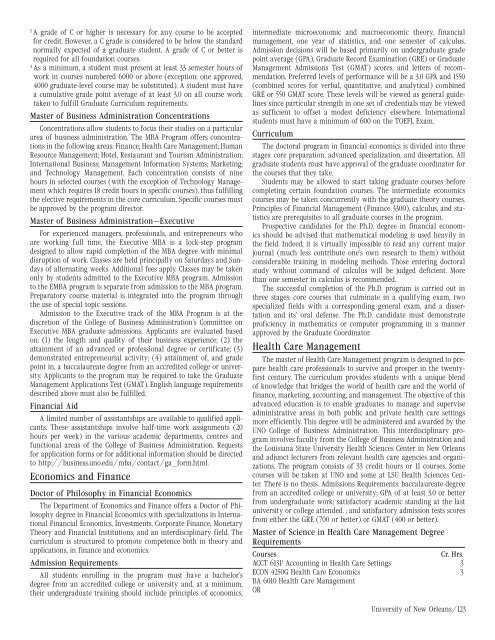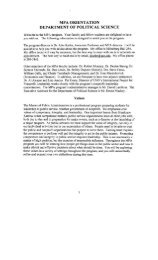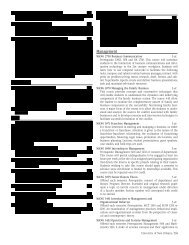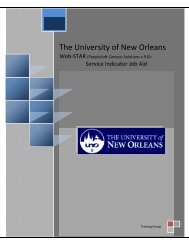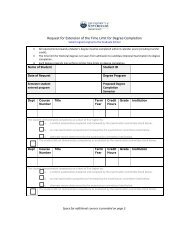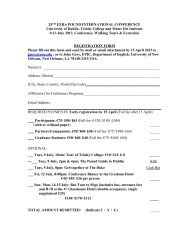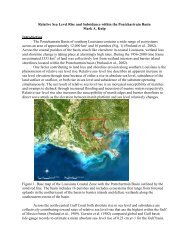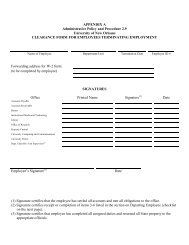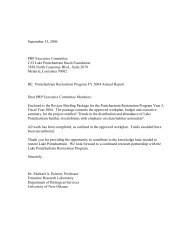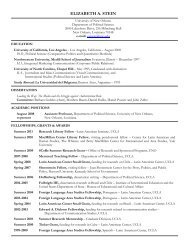Untitled - University of New Orleans
Untitled - University of New Orleans
Untitled - University of New Orleans
You also want an ePaper? Increase the reach of your titles
YUMPU automatically turns print PDFs into web optimized ePapers that Google loves.
3<br />
A <br />
grade <strong>of</strong> C or higher is necessary for any course to be accepted<br />
for credit. However, a C grade is considered to be below the standard<br />
normally expected <strong>of</strong> a graduate student. A grade <strong>of</strong> C or better is<br />
required for all foundation courses.<br />
4<br />
As <br />
a minimum, a student must present at least 33 semester hours <strong>of</strong><br />
work in courses numbered 6000 or above (exception: one approved,<br />
4000 graduate-level course may be substituted). A student must have<br />
a cumulative grade point average <strong>of</strong> at least 3.0 on all course work<br />
taken to fulfill Graduate Curriculum requirements.<br />
Master <strong>of</strong> Business Administration Concentrations<br />
Concentrations allow students to focus their studies on a particular<br />
area <strong>of</strong> business administration. The MBA Program <strong>of</strong>fers concentrations<br />
in the following areas: Finance; Health Care Management; Human<br />
Resource Management; Hotel, Restaurant and Tourism Administration;<br />
International Business; Management Information Systems; Marketing;<br />
and Technology Management. Each concentration consists <strong>of</strong> nine<br />
hours in selected courses (with the exception <strong>of</strong> Technology Management<br />
which requires 18 credit hours in specific courses), thus fulfilling<br />
the elective requirements in the core curriculum. Specific courses must<br />
be approved by the program director.<br />
Master <strong>of</strong> Business Administration—Executive<br />
For experienced managers, pr<strong>of</strong>essionals, and entrepreneurs who<br />
are working full time, the Executive MBA is a lock-step program<br />
designed to allow rapid completion <strong>of</strong> the MBA degree with minimal<br />
disruption <strong>of</strong> work. Classes are held principally on Saturdays and Sundays<br />
<strong>of</strong> alternating weeks. Additional fees apply. Classes may be taken<br />
only by students admitted to the Executive MBA program. Admission<br />
to the EMBA program is separate from admission to the MBA program.<br />
Preparatory course material is integrated into the program through<br />
the use <strong>of</strong> special topic sessions.<br />
Admission to the Executive track <strong>of</strong> the MBA Program is at the<br />
discretion <strong>of</strong> the College <strong>of</strong> Business Administration’s Committee on<br />
Executive MBA graduate admissions. Applicants are evaluated based<br />
on: (1) the length and quality <strong>of</strong> their business experience; (2) the<br />
attainment <strong>of</strong> an advanced or pr<strong>of</strong>essional degree or certificate; (3)<br />
demonstrated entrepreneurial activity; (4) attainment <strong>of</strong>, and grade<br />
point in, a baccalaureate degree from an accredited college or university.<br />
Applicants to the program may be required to take the Graduate<br />
Management Applications Test (GMAT). English language requirements<br />
described above must also be fulfilled.<br />
Financial Aid<br />
A limited number <strong>of</strong> assistantships are available to qualified applicants.<br />
These assistantships involve half-time work assignments (20<br />
hours per week) in the various academic departments, centres and<br />
functional areas <strong>of</strong> the College <strong>of</strong> Business Administration. Requests<br />
for application forms or for additional information should be directed<br />
to http://business.uno.edu/mba/contact/ga_form.html.<br />
Economics and Finance<br />
Doctor <strong>of</strong> Philosophy in Financial Economics<br />
The Department <strong>of</strong> Economics and Finance <strong>of</strong>fers a Doctor <strong>of</strong> Philosophy<br />
degree in Financial Economics with specializations in International<br />
Financial Economics, Investments, Corporate Finance, Monetary<br />
Theory and Financial Institutions, and an interdisciplinary field. The<br />
curriculum is structured to promote competence both in theory and<br />
applications, in finance and economics.<br />
Admission Requirements<br />
All students enrolling in the program must have a bachelor’s<br />
degree from an accredited college or university and, at a minimum,<br />
their undergraduate training should include principles <strong>of</strong> economics,<br />
intermediate microeconomic and macroeconomic theory, financial<br />
management, one year <strong>of</strong> statistics, and one semester <strong>of</strong> calculus.<br />
Admission decisions will be based primarily on undergraduate grade<br />
point average (GPA), Graduate Record Examination (GRE) or Graduate<br />
Management Admissions Test (GMAT) scores, and letters <strong>of</strong> recommendation.<br />
Preferred levels <strong>of</strong> performance will be a 3.0 GPA and 1550<br />
(combined scores for verbal, quantitative, and analytical) combined<br />
GRE or 550 GMAT score. These levels will be viewed as general guidelines<br />
since particular strength in one set <strong>of</strong> credentials may be viewed<br />
as sufficient to <strong>of</strong>fset a modest deficiency elsewhere. International<br />
students must have a minimum <strong>of</strong> 600 on the TOEFL Exam.<br />
Curriculum<br />
The doctoral program in financial economics is divided into three<br />
stages: core preparation, advanced specialization, and dissertation. All<br />
graduate students must have approval <strong>of</strong> the graduate coordinator for<br />
the courses that they take.<br />
Students may be allowed to start taking graduate courses before<br />
completing certain foundation courses. The intermediate economics<br />
courses may be taken concurrently with the graduate theory courses.<br />
Principles <strong>of</strong> Financial Management (Finance 3300), calculus, and statistics<br />
are prerequisites to all graduate courses in the program.<br />
Prospective candidates for the Ph.D. degree in financial economics<br />
should be advised that mathematical modeling is used heavily in<br />
the field. Indeed, it is virtually impossible to read any current major<br />
journal (much less contribute one’s own research to them) without<br />
considerable training in modeling methods. Those entering doctoral<br />
study without command <strong>of</strong> calculus will be judged deficient. More<br />
than one semester in calculus is recommended.<br />
The successful completion <strong>of</strong> the Ph.D. program is carried out in<br />
three stages: core courses that culminate in a qualifying exam, two<br />
specialized fields with a corresponding general exam, and a dissertation<br />
and its’ oral defense. The Ph.D. candidate must demonstrate<br />
pr<strong>of</strong>iciency in mathematics or computer programming in a manner<br />
approved by the Graduate Coordinator.<br />
Health Care Management<br />
The master <strong>of</strong> Health Care Management program is designed to prepare<br />
health care pr<strong>of</strong>essionals to survive and prosper in the twentyfirst<br />
century. The curriculum provides students with a unique blend<br />
<strong>of</strong> knowledge that bridges the world <strong>of</strong> health care and the world <strong>of</strong><br />
finance, marketing, accounting, and management. The objective <strong>of</strong> this<br />
advanced education is to enable graduates to manage and supervise<br />
administrative areas in both public and private health care settings<br />
more efficiently. This degree will be administered and awarded by the<br />
UNO College <strong>of</strong> Business Administration. This interdisciplinary program<br />
involves faculty from the College <strong>of</strong> Business Administration and<br />
the Louisiana State <strong>University</strong> Health Sciences Center in <strong>New</strong> <strong>Orleans</strong><br />
and adjunct lecturers from relevant health care agencies and organizations.<br />
The program consists <strong>of</strong> 33 credit hours or 11 courses. Some<br />
courses will be taken at UNO and some at LSU Health Sciences Center.<br />
There is no thesis. Admissions Requirements: baccalaureate degree<br />
from an accredited college or university; GPA <strong>of</strong> at least 3.0 or better<br />
from undergraduate work; satisfactory academic standing at the last<br />
university or college attended. ; and satisfactory admission tests scores<br />
from either the GRE (700 or better) or GMAT (400 or better).<br />
Master <strong>of</strong> Science in Health Care Management Degree<br />
Requirements<br />
Courses<br />
Cr. Hrs.<br />
ACCT 6131 1 Accounting in Health Care Settings 3<br />
ECON 4250G Health Care Economics 3<br />
BA 6010 Health Care Management<br />
OR<br />
<strong>University</strong> <strong>of</strong> <strong>New</strong> <strong>Orleans</strong>/123


